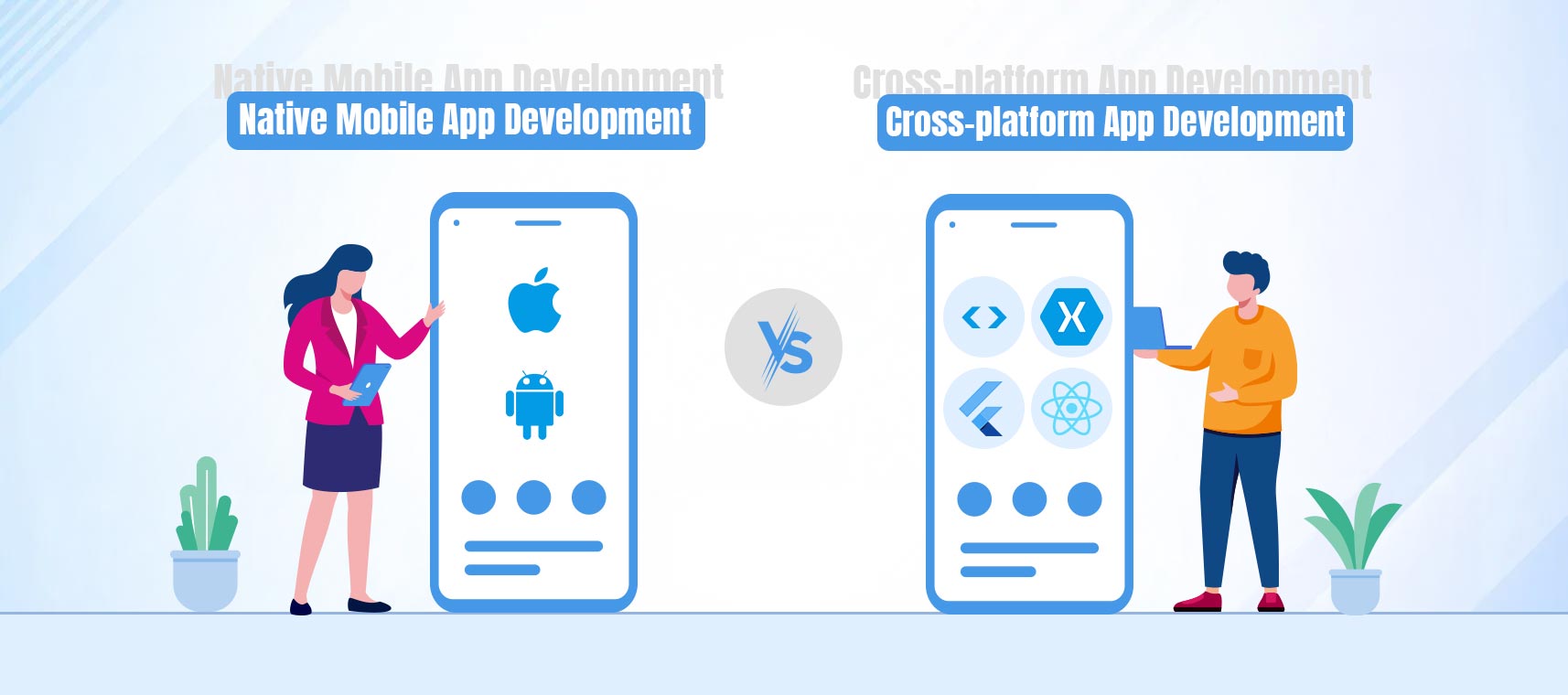
Native vs Cross-platform Mobile App Development: How to Choose
With over 4.4 million apps available on Google Play and the App Store, it’s no secret that mobile apps dominate our daily lives. They connect us, entertain us, and solve everyday problems. If you’re planning to launch an app, one of the first big questions is: Should you go for native or cross-platform mobile app development services?
This choice will directly impact your app’s performance, budget, and development timeline. Let’s explore the key factors to help you make the right decision for your business.
6 Key Factors to Consider Before Choosing
Choosing between native and cross-platform isn’t just about technology—it’s about meeting your goals. Here are the most important factors to keep in mind:
1. Cost
- Cost plays a huge role in app development decisions. If staying within budget is crucial, cross-platform mobile app development services are typically the more affordable option. Why? A single codebase powers apps for both iOS and Android, saving time and resources.
- On the other hand, native app development requires separate codebases for each platform, which increases costs due to the need for specialized teams.
2. Time to Market (TTM)
In today’s competitive market, speed matters.
- Cross-platform development allows for faster launches since one codebase serves multiple platforms.
- Native mobile app development, while slower, can deliver superior quality with features tailored to each platform.
3. Performance
- When performance is a priority, native mobile apps are hard to beat. They’re designed specifically for their platforms, offering faster load times, smoother animations, and better responsiveness.
- Cross-platform development, while improving thanks to frameworks like Flutter and React Native, might not match the performance of native apps in high-demand scenarios like gaming or real-time analytics.
4. User Experience (UX)
Great UX is a cornerstone of any successful app.
- Native apps provide a polished and seamless experience since they adhere to platform-specific design guidelines.
- Cross-platform apps offer good UX but might miss the refined details of native apps.
5. Offline Support
Does your app need to work in areas with poor connectivity? Offline support is crucial.
- Native mobile apps generally handle offline functionality better.
- Cross-platform apps can also offer offline features, though the implementation might be slightly less reliable.
6. Updates
Frequent updates are essential for keeping your app secure, bug-free, and competitive.
- Native apps require platform-specific updates, which can be time-consuming.
- Cross-platform mobile app development services make updates quicker with a single codebase, though framework-wide changes can sometimes cause delays.
Key Differences Between Native Apps and Cross-Platform Apps
The following are the key differences between Native and Cross-Platform App:
-
Performance
Native App: Natives run faster and smoothly since they are tailored to the system. Direct access to hardware and API means that smooth animations, quick loading, and responsive performances are free from glitches and bugs.
Cross-Platform App: Cross-platform applications almost run equally due to frameworks like Flutter and React Native. However, they still lag natives, especially in graphically demanding or data-intensive real-time applications.
Also Know: Benefits and Challenges of React Native
-
Development Time and Cost
Native: The native applications have different code bases that exist within both the OS’s, iOS and Android, so it thus consumes specialty groups and expands both time and cost of development.
Cross-Platform: The cross-platform applications tend to be much quicker and less expensive because they use one code base within the platforms hence consume fewer resources and thus reduce the cost of its development.
-
Maintenance Updates
Native: Upgrading a native application will require an upgrade in methods for every kind of platform that takes a lot of time and resources.
Cross-Platform: The cross-platform apps require up-gradation in the codebase that requires just one. This means efficiency is maintained and thus a lot of time is saved.
-
Scalability
Native: Native apps scale rather fast. They can even handle most complex features and high-performance demands.
Cross-Platform: Achievable scalability for cross-platform apps can be but may have a limit for complex features or high-performance demands.
Also Read:
Conclusion
In conclusion, your choice between native and cross-platform app development depends on your app’s priorities: opt for native mobile app development if you value performance and tailored experiences, or go with cross-platform for faster, cost-effective solutions that reach a wider audience. TFT is a leading React Native app development company specializing in mobile app development services that deliver exceptional results. Whether you’re considering native or cross-platform app development, our team has the expertise to turn your app vision into reality.
Let’s bring your vision to life—contact us today!
Recent Blogs
- Low-Code RPA: Empowering Citizen Developers Through Automation
- RPA Software Solution: Intelligent Document Processing with RPA
- RPA Software Solution: Transforming Business with Smarter Automation Tools
- Salesforce Implementation Services: Meet Your New AI Teammates
- Salesforce Services: How Modern Engineering Is Revolutionizing CRM Solutions
Categories
- Agritech (1)
- AR/VR (5)
- Artificial Intelligence (55)
- Machine Learning (1)
- Blockchain (4)
- Business Intelligence (3)
- CRM (5)
- SalesForce (4)
- Data Engineering (8)
- Data protection (2)
- Development (104)
- Golang Development (15)
- Python Web Development (9)
- React JS (5)
- React native (10)
- Devops (3)
- Hire Developers (3)
- Internet of Things (IoT) (5)
- Kubernetes (2)
- Machine Learning (2)
- Mobile App Development (44)
- Node.js (7)
- outsourcing (7)
- Partnership (4)
- Performance Testing (3)
- RPA (21)
- Security (24)
- Strategy (1)
- Testing (110)
- Accessibility Testing (2)
- Automation Testing (22)
- Dynamic Testing (1)
- Manual Testing (3)
- Mobile App Testing (13)
- Offshore Software Testing (6)
- Penetration Testing Services (13)
- QA testing (16)
- Remote Software Testing (7)
- Software Testing (19)
- Website Design (22)